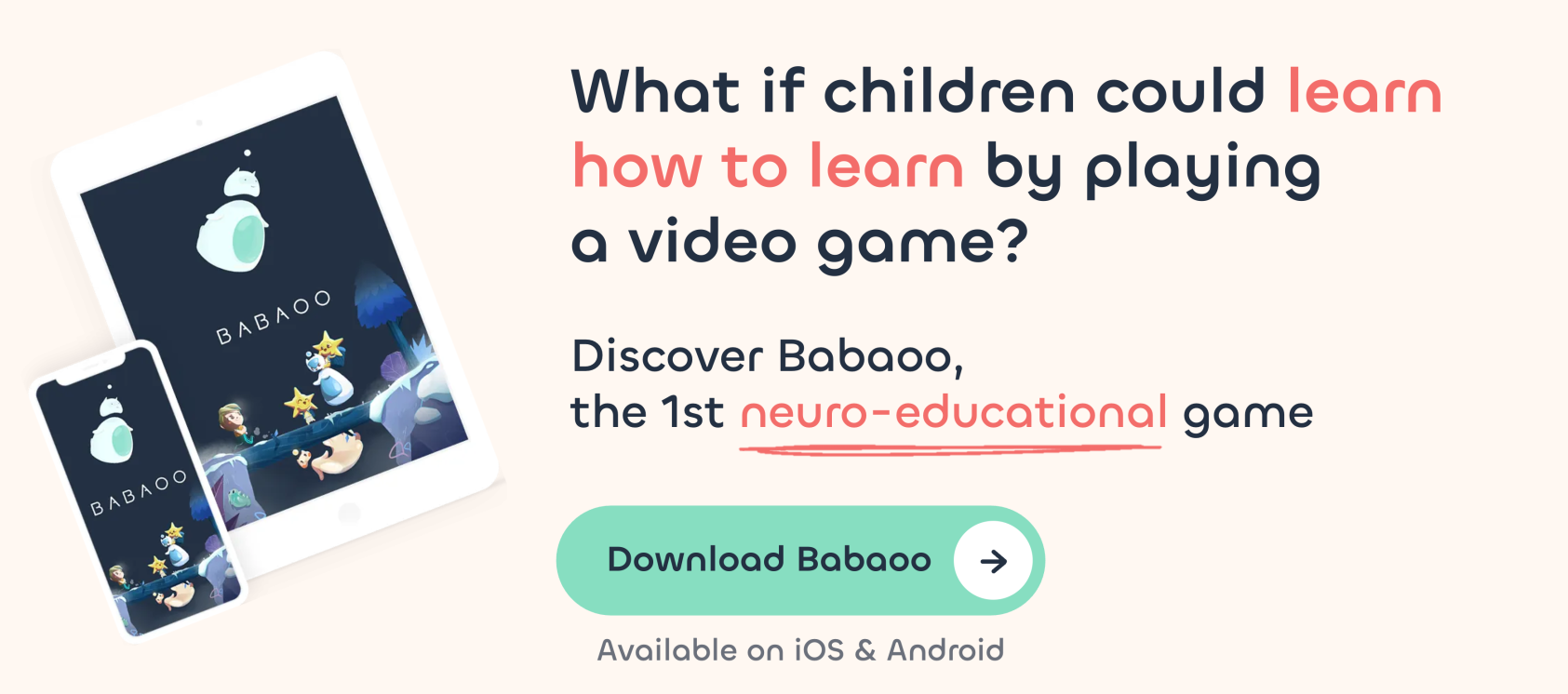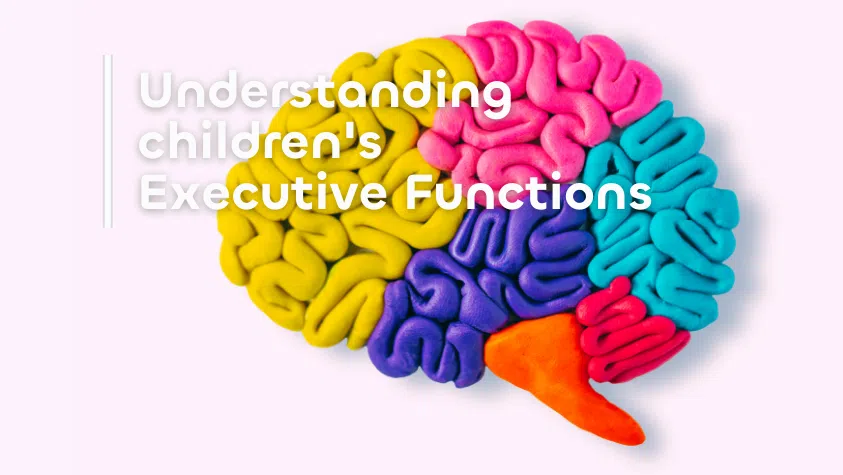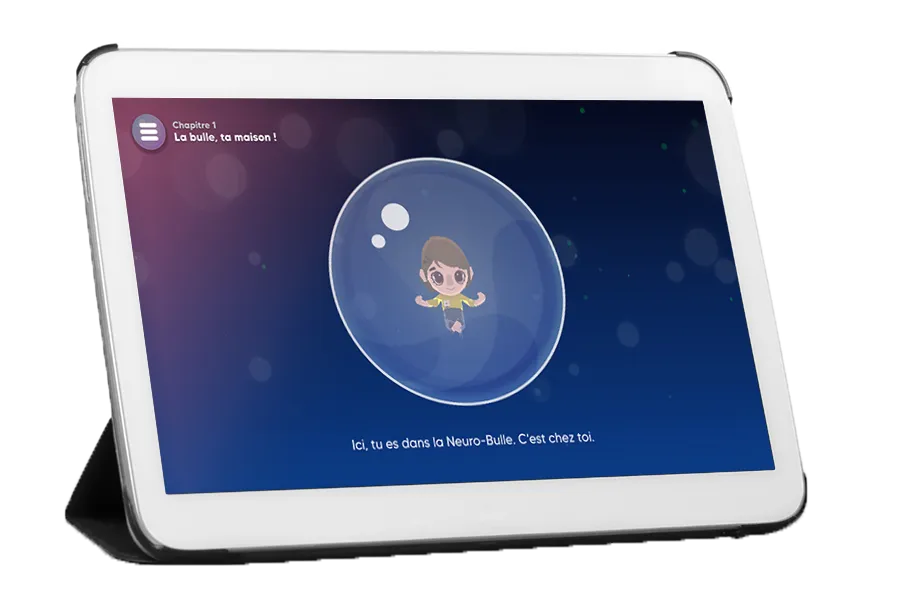Walking, talking, reading, cycling… Our little ones have so much to learn! But have you ever wondered what all this learning has in common? They all require the use of superpowers: the executive functions (Attention, Inhibition, Working Memory, Flexibility and Planning). Neuroscientists now agree that these cognitive functions form the basis of all learning. But that’s not all! What if we told you that these brain skills play a dominant role in all spheres of our little ones’ lives?
Do you want to better understand executive functions? Babaoo Mag sums it up for you!💡
Executive functions, what are they?
Imagine an airport in which aircraft departures and arrivals depend solely on the goodwill of the pilots… Mayday, we’ve got a problem on the runway! 🆘 Fortunately, there are constantly interacting control towers to ensure that everything runs smoothly. In our brains, it’s the same! Thoughts, emotions, sensations: a multitude of information circulates between our neurons. So without a team working together to bring some order to it all, we’d simply be unable to function efficiently! These teams are the executive functions, the main ones of which are Attention, Inhibition, Working Memory, Flexibility and Planning.
Attention
Attention is like a detective searching our environment for clues to pass on useful information. 🧐 Even if it hasn’t always been considered an executive function, it is so present in our daily lives and in our learning that it’s impossible not to mention it! That’s right, unless it’s automated, every task, no matter how simple, requires us to pay attention to it in order for it to be carried out properly (we actually talk about “executive attention”).
Inhibition
Inhibition is the ability to say “STOP: I think and then I act”. ⛔ In other words, it is the ability to regulate one’s impulsivity, to resist an automatism that is inappropriate for the task in hand, in order to adopt more appropriate behaviour. Inhibition is therefore associated with self-mastery, self-control and perseverance! In fact, having good inhibitory control also means being able to manage distractions that could divert us from a task, or avoid giving in to the urge to throw everything out when things don’t go according to plan.
Working Memory
Working Memory is often confused with short-term memory. However, it is important to distinguish between these two closely related, yet different, concepts. While short-term memory simply allows us to retain information for a short period of time, Working Memory goes further: it allows us not only to hold this information in our heads, but also to manipulate and use it. Take the example of a telephone number: remembering it means using your short-term memory. Remembering it and repeating it backwards, on the other hand, uses your Working Memory, because you have to manipulate this information.
Working Memory is therefore crucial for reasoning because it helps us to establish links between different ideas. It plays an essential role in all tasks that require prolonged mental effort, such as solving a complex problem, or more simply, taking part in a conversation. Imagine how limited our exchanges would be if we couldn’t instantly recall what our interlocutor has just said and relate it to our own thoughts! 😅
Flexibility
Flexibility corresponds to mental flexibility and is closely linked to creativity! Being “flexible” means being able to see things in a new light, to think “out of the box” and to adapt to novel situations. It’s also to this executive function that we owe our ability to switch from one task to another, or juggle several rules within the same game. 🤹
Planning
Ah, Planning! It’s the one that takes charge of designing your ‘life project’, even if it’s just deciding what to do for the next few minutes. Planning is about setting milestones, forecasting resources and anticipating obstacles to achieve a specific goal. You know, it’s that little voice inside you that says: “OK, first I’ll prepare the ingredients, then preheat the oven and then put the pizza in the oven.” 🍕 It’s also what helps our little ones organise their day, managing their time between homework and leisure activities with friends. More than a simple “to-do list”, planning engages our ability to prioritise tasks, assess risks and adjust our aim if necessary.
Attention, Inhibition, Working Memory, Flexibility and Planning are the foundations of our ability to learn, interact and adapt to the world around us. In fact, it’s like an orchestra! In an orchestra, each musician plays a specific and crucial role. But it’s only when all the instruments play in harmony that the whole is coherent. In the same way, these five Executive Functions work together to enable us to make informed decisions, think critically and solve complex problems brilliantly.
✏ Note: but what does it look like in practice?🧐 Imagine your child is tasked with putting together a 100-piece jigsaw puzzle. 🧩 Attention is the first executive function to come into play. It enables him to target the essential pieces of the jigsaw. Meanwhile, Inhibition blocks external distractions to keep him focused while Working Memory retains the pieces already placed. If anything goes wrong, Flexibility steps in to change tactics. Lastly, Planning is responsible for devising the overall strategy: it’s the score. 🎼 “First, I’m going to find all the corners. Then I’ll build the edges. After that, I can fill in the middle.”
The essential role of executive functions
Superheroes have their capes and gadgets. Our brains, on the other hand, have their executive functions. 💪 These remarkable cognitive tools play an essential role in our children’s daily lives, whether it’s managing their emotions, doing their homework at home or resolving a conflict in the playground. And these skills are not just important at school: they play a decisive role in many aspects of their lives.
In fact, if you were to compare the human brain to an orchestra, the executive functions would be the maestro. They regulate and direct most of our cognitive and socio-emotional activities. Without them, our brain would simply be in disarray.

Executive functions: an indicator of academic success
Have you ever heard the expression “It’s all in your head”? Well, in this case, it’s literally true! Research shows that children with strong executive functions generally do better at school. It’s not just a question of knowing your lesson well, but also of knowing how to organise yourself to retain it, how to manage stress before a test or how to bounce back after a failure.
While the so-called “cold” executive functions are associated with purely cognitive tasks, such as solving a geometry problem, for example, the “hot” executive functions relate to managing our emotions. Together, they act as a “cognitive GPS” in our children’s brains, guiding them through the complexities of education.
✏ Note: a chair, a vase, curtains, a banana, a schoolbag… As well as remembering this list of words, try reciting it backwards! This little test involves your “cold”executive functions. On the other hand, the marshmallow experiment – where the longer the child resists the urge to eat it, the more they get – elicits emotion and decision-making, calling on the “warm”executive functions.🌡
Beyond school: social and professional success
The crucial importance of Executive Functions is not limited to the school benches
They also prepare our little protégés to face the challenges of everyday life. Whether it’s resolving a conflict with a buddy and showing empathy, facing the unknown and adapting to new situations, or later, juggling meetings and deadlines at work. In fact, executive functions underpin our ability to interact with others, adapt and get ahead in life. By helping to create healthy relationships, make informed decisions and even prevent problems, they condition our academic, professional and social success.
A 2011 study of 1,000 children measured the impact of executive functions on their development. The results speak for themselves: children with weaker cognitive control at the age of 3 had, as they grew up, a greater likelihood of encountering difficulties, whether it was getting a job, managing their finances, avoiding smoking or not breaking imposed rules.
✏ Note: rest assured! Just because your sweetie turned into a little monster when you refused him a third packet of sweets at the supermarket doesn’t mean he’s bound to go bad! 😅 Although the positive impact of Executive Functions on a child’s academic and socio-emotional success seems undeniable, it’s vital to stress that these are probabilities, not inevitable fates… What’s more, we now know that Executive Functions can improve with practice!
Executive Functions at the heart of education
Convinced that skills linked to executive functions form the foundations of a child’s overall development, Canada and the Scandinavian countries, among others, make their development a priority, starting at nursery school. Although executive functions can develop at any age, there is a developmental boost at pre-school age.
Much more than a simple indicator, and because they have a positive influence on a child’s cognitive, motor, emotional or even social development, executive functions can predict a child’s future success and even surpass predictions based on IQ… Just that!
The Babaoo recap!
Attention, Inhibition, Working Memory, Flexibility and Planning. Executive functions are to the brain what instruments are to the symphony: indispensable.
By intervening in the cognitive, motor, emotional and affective spheres of a child’s life, they form the foundations of their overall development and play a decisive role in their academic, professional and social success, as well as their well-being.
Good news: even if the ideal is to start developing these superpowers from an early age, executive functions are not set in stone. On the contrary, they can be stimulated, strengthened and developed through targeted games, activities and educational practices, whether at school or at home.
Babaoo: the game that boosts Executive Function development
Are you a parent or teacher? Give your child or young pupils an invaluable tool for successfully navigating the complex world around them. Babaoo is that tool! An educational game that promotes the development of Executive Functions. 🚀





